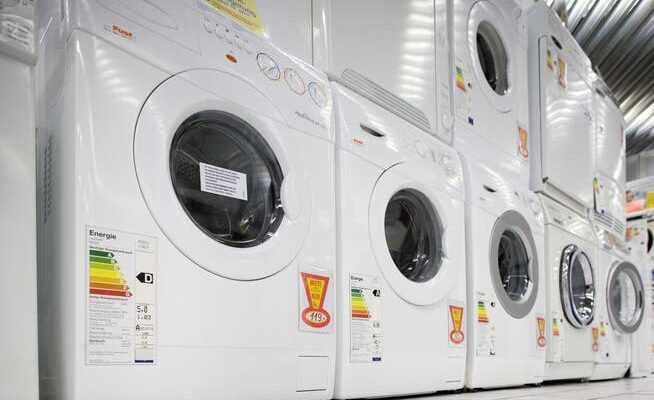The EU Commission also wants to achieve its climate goals by making products sold on the internal market more environmentally friendly in the future. To this end, she proposes a revision of the Ecodesign Directive. In the future, she could have a say in the design of almost all products.
Labels on refrigerators, washing machines or tumble dryers provide information about energy consumption.
What is a good shower head, how do you build a wine fridge, and how powerful should a vacuum cleaner be? The European Union no longer wants to leave these questions to the companies. Rather, within the framework of the so-called Ecodesign Directive of 2005, it makes regulations on minimum requirements for the design of products. And these sometimes pack a punch, as the end of the light bulb shows. This was not banned, but no longer meets the European minimum requirements for lighting.
The end of fast fashion?
So far, however, the directive has been limited to products that, to put it simply, are powered by electricity and to those that influence energy consumption. Examples include dishwashers, coffee machines and shower heads and windows. But now Brussels wants to go even further and be able to regulate almost every product with such minimum requirements in the future. The EU Commission presented a corresponding bundle of templates in Brussels on Wednesday.
The panel wants products in the future not only to use less energy, but also to be thrown away less quickly, made with less environmental impact and made with more recovered materials. Consumers should therefore also be able to repair and reuse objects more easily. Ultimately, Brussels wants to overcome the throwaway society.
This also means that the commission wants to ban the so-called fast fashion business model from fashion, as stated in a presentation by the commission. The Spanish fashion group Zara is one of the best-known representatives of fast fashion. He has specialized in reacting very quickly to trends and bringing the appropriate items of clothing onto the market within a short period of time and for little money. Critics complain that consumers buy too many clothes and throw them away too quickly.
A new EU strategy for sustainable and circular textiles now states that clothes sold on the internal market must be recyclable by 2030 and made to a large extent from recovered fibres. In addition, large companies should, for example, show how many items of clothing they do not sell and throw away. In Brussels, there seems to be a feeling that the average consumer still doesn’t know how the textile industry works and that if they knew more they would leave the cheap clothes in the store and just walk around with a pair of jeans.
The Commission wants more influence
With the revised Ecodesign Directive, the Commission wants to be able to regulate products that are responsible for around two-thirds of all product-related greenhouse gas and particulate matter emissions in the EU and for 70 percent of resource consumption.
Which things these are exactly should be based on the already existing process of the directive. This stipulates that the Commission will present a work plan every three years with the products that are eligible for regulation. For 2022 to 2024, Brussels wants to adjust the rules for heating and energy labels, issue new ones for smartphones, tablet computers, solar panels, printers, scanners and commission studies for electric car charging stations and universal charging cables. Materials used in construction are not spared either.
Based on this work plan, Brussels then orders studies, then carries out consultations, has impact assessments written and then issues the new regulations. The EU Parliament and the Council of the 27 member states are also presented with the new requirements, but they have significantly less influence than in a normal legislative procedure.
The Commission has a lot of leeway with such so-called implementation measures. With the revision of the Ecodesign Directive, the committee around President Ursula von der Leyen also wants to increase the influence and design options of the Commission.
A pass for each product
Last but not least, a major information offensive is planned. The environmental design guidelines also include the energy label, which provides information about the consumption of products. In the EU, refrigerators, washing machines and tumble dryers have stickers that provide information about their energy consumption in categories A (green, good) to G (red, bad).
This system is now to be expanded into a kind of digital product pass that could be accessed via a QR code, for example. The Commission wants to store information about the composition of the product, the origin of the individual components, the ecological footprint and information on recycling in a decentralized database.
The EU Commission is also proposing that consumers have the right to know what the expected lifespan of a product is and whether it can be repaired. In this case, manufacturers would have to provide the relevant information. However, this is not (yet) a much more extensive right to repair. To this end, the Commission is currently conducting a public consultation and intends to present a corresponding legislative proposal in the third quarter.
And finally, the guideline on unfair business practices is to be adjusted in order to prevent so-called greenwashing and the limited lifespan of products planned from the outset. For example, general, vague claims about the effects on the environment that cannot be proven should be prohibited. This applies, for example, to the use of words such as “ecological”, “green” and “environmentally friendly”.
The proposals now go to the Council of Member States and the EU Parliament.
